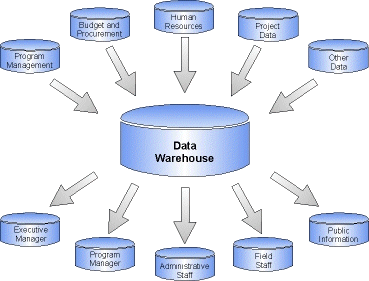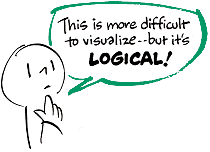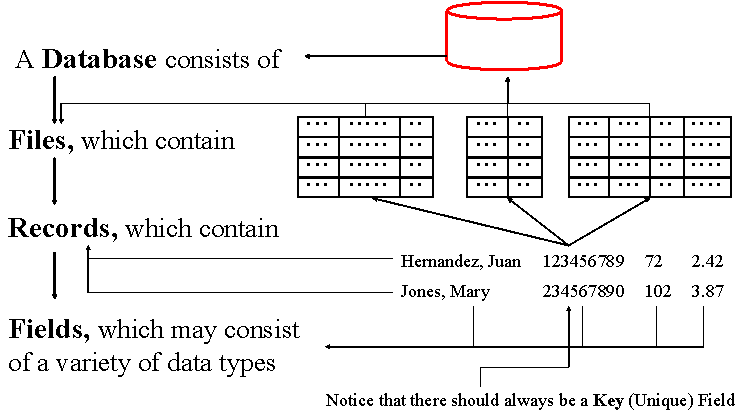What is a Database??
 We are all relatively familiar with databases, and we see
them everyday. As stated in the Course description, "Databases have become THE most important Information System package for
Corporations. Without them, most companies would have a hard time functioning. MOST (and
that truly means almost all) Companies could NOT exist without them."
Imagine what a corporation such as American Express, with approximately 30
Million customers, world wide, would do without them.
We are all relatively familiar with databases, and we see
them everyday. As stated in the Course description, "Databases have become THE most important Information System package for
Corporations. Without them, most companies would have a hard time functioning. MOST (and
that truly means almost all) Companies could NOT exist without them."
Imagine what a corporation such as American Express, with approximately 30
Million customers, world wide, would do without them.
There is a relatively
simple definition of a database:
"A database is a
large, logical, integrated collection of data and metadata"
??? What
does that mean ???
??? What is Metadata ???
Let's break down the statement:
 Large. We make the assumption that we
are dealing with a lot of data (by the way, data is the plural of datum (a
single piece of data)). We are assuming that we are dealing with a large number
of records (to be defined later), such as American Express. far too large a
number to be dealt with in Random Access Memory.
Large. We make the assumption that we
are dealing with a lot of data (by the way, data is the plural of datum (a
single piece of data)). We are assuming that we are dealing with a large number
of records (to be defined later), such as American Express. far too large a
number to be dealt with in Random Access Memory.
 Logical. As users of the database, we
are not necessarily concerned with how the database is actually (physically)
stored. As we will see later, we have a logical view of the database, and are
able to access the data contained in it according to how we visualize it.
Logical. As users of the database, we
are not necessarily concerned with how the database is actually (physically)
stored. As we will see later, we have a logical view of the database, and are
able to access the data contained in it according to how we visualize it.
 Integrated
Collection. We make the assumption
that we are inter-relating a number of different subject areas. For example, as
a student, there are different areas which are concerned with you: The registrar
is concerned about what courses you are taking; the bursar is concerned with how
much (if any) you owe them; the instructor of a course is concerned with how you
are doing in the class. All of these are separate issues, but are related by one
issue: You, the student. It is basically the difference between a
spreadsheet (such as Excel) and a database (such as Oracle or Access), A
spreadsheet is set-up for a specific purpose (the registrar, bursar, or
instructor might keep spreadsheets on you), whereas a database keeps
general information (data - we'll discuss the difference later) about
you which all of the areas can draw from.
Integrated
Collection. We make the assumption
that we are inter-relating a number of different subject areas. For example, as
a student, there are different areas which are concerned with you: The registrar
is concerned about what courses you are taking; the bursar is concerned with how
much (if any) you owe them; the instructor of a course is concerned with how you
are doing in the class. All of these are separate issues, but are related by one
issue: You, the student. It is basically the difference between a
spreadsheet (such as Excel) and a database (such as Oracle or Access), A
spreadsheet is set-up for a specific purpose (the registrar, bursar, or
instructor might keep spreadsheets on you), whereas a database keeps
general information (data - we'll discuss the difference later) about
you which all of the areas can draw from.
Data. We discuss data below.
 Metadata. Metadata is data about data.
It describes how and when
and by whom a particular set of data was collected, and how the data is
formatted. A good example of metadata is a data dictionary. As we will see
later, a data dictionary contains such information as what fields are contained
in a table, what types of data are stored in that field (integers,
floating-point, characters, or abstract data types, how they are to be
displayed, primary keys, foreign keys, constraints on data entry, and so forth).
Metadata. Metadata is data about data.
It describes how and when
and by whom a particular set of data was collected, and how the data is
formatted. A good example of metadata is a data dictionary. As we will see
later, a data dictionary contains such information as what fields are contained
in a table, what types of data are stored in that field (integers,
floating-point, characters, or abstract data types, how they are to be
displayed, primary keys, foreign keys, constraints on data entry, and so forth).
??? OK, You
said you would talk about data ???
??? What's that all about ???

There
is a difference between data
and Information
(although we tend to use the same term, as we shall in this test).
Information is something that
increases our knowledge. For example, the statement:
Mary is an 'A' Student
Tells us
something about Mary (She is an 'A' Student). It expands our knowledge (about
Mary). If we were to keep data
(remember, this is plural) about Mary, we might store:
Smith, Mary 34 92 123 MIS 778 INFOSYS
 Which tells
us essentially nothing about Mary. However, looking at the data above, we do get the feeling
that there is a pattern as to how it is stored. That gives us a basic definition
for data: data is a non-random collection of symbols.
Which tells
us essentially nothing about Mary. However, looking at the data above, we do get the feeling
that there is a pattern as to how it is stored. That gives us a basic definition
for data: data is a non-random collection of symbols.
??? How else
can we characterize databases ???
 It
is a way of modeling the 'real-world' (at least parts of it). It refers to
entities (something
we wish to keep data on -- i.e., people places, things), entity
attributes (specific data
about an entity -- e.g., a person's height, a place's area code, a thing's
dimensions) and the relationships
between entities (e.g., an order may contain several parts).
It
is a way of modeling the 'real-world' (at least parts of it). It refers to
entities (something
we wish to keep data on -- i.e., people places, things), entity
attributes (specific data
about an entity -- e.g., a person's height, a place's area code, a thing's
dimensions) and the relationships
between entities (e.g., an order may contain several parts).
??? What is
it really ???
It is
how an
organization stores information. The university, for example, keeps a lot of
information about you (Your address, major, courses taken, grades received, an
so forth). All of this data is stored in a database.
??? How is
this data stored???
Consider the
following statement:
"You are an entity
with attributes
which vary. Within the University, different areas
have different interests in you (i.e., the Registrar, the Bursar, etc.).
Nonetheless, you are still part of the University as a whole"
| Item |
Database Component |
Stored As |
| You |
Entity |
Record |
| Your Height, Weight, etc, |
Attribute |
Field |
| 5'2", 5'9", 6'2", etc
|
Attribute Value |
Specific Data type |
| Registrar, Bursar, etc |
File/Database |
Tables/Files |
| University |
Database |
Database |
Diagramatically, this could be stated as:

??? Why
should we use databases ???
That is the
next topic


This page was last updated on
02/26/04.
